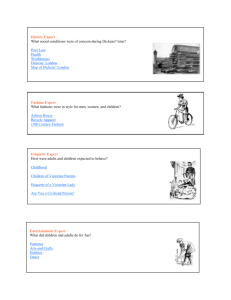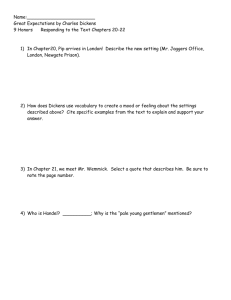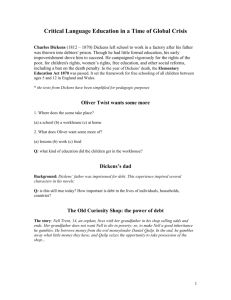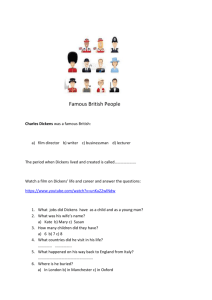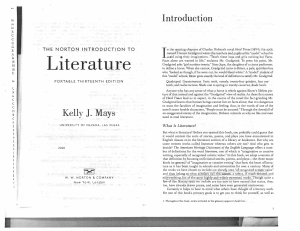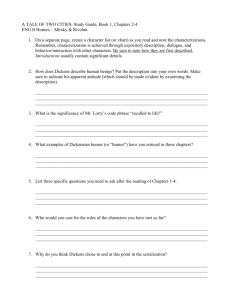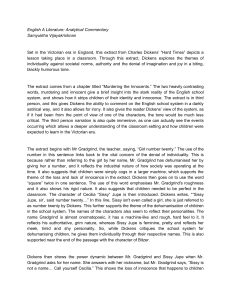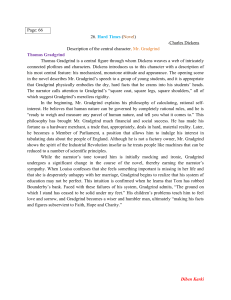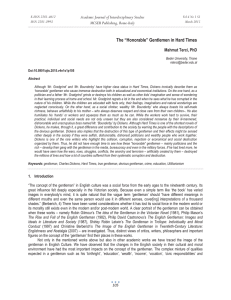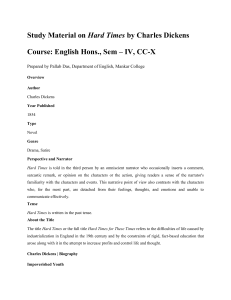Hard Times - TeacherWeb
advertisement
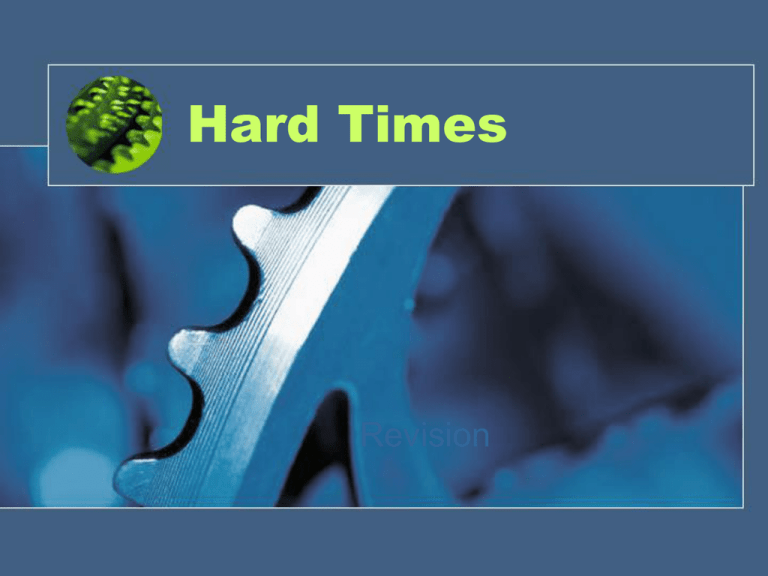
Hard Times Revision Charles Dickens 1812-1870 Serialization • Weekly in ‘Household Words’ to include ‘the light of Fancy which is inherent in the human breast.’ • ‘ a mere two penny journal, was to be found on every table and in every room, in the palace and the cottage.’ Percy Fitzgerald. Household Words • Whilst Hard Times was the weekly serial, the magazine contained articles on divorce, industrialisation, the circus, education political economy etc. • The effect was to blur the difference between the fiction of Hard Times and the journalistic pieces. Also when Hard Times was all fact- Stephen and the trade union section, Dickens put in articles on the circus. School • The teachers at the school are Mr and Mrs M’Choakumchild – not Mr Gradgrind; he is a business man visiting the school to which he is apparently the patron. • The children at the school are all numbered – based on a famous school in Manchester. • We meet Sissy and Bitzer here. Context • Set in 1854 at the height of the Industrial Revolution • Urbanisation • Poverty, poor sanitary conditions, disease e.g. cholera, typhoid, smallpox, long working hours, dangerous working conditions- One newborn child in six died, and half the children which survived died of whooping cough or diphtheria in Manchester in 1840. Context Society had changed from where the home was a site of production by woman (food, clothes etc). In the nineteenth century it became a site of consumption alone. Working class women were forced to work outside the home to support their families which created terrible pressures on mothers. Context • Dedicated to Thomas Carlyle, author of The French Revolution • Carlyle thought industrialisation was dehumanising the working classes. • Like Dickens, he was anti-industrial because he disapproved of its effect in social levelling. Utilitarianism • Jeremy Bentham (ethical hedonist) greatest good for the greatest number • Felicific calculus-algorithm for calculating the degree or amount of pleasure that a specific action is likely to cause. • Gradgrind is the voice of this political philosophy – Carlyle called them ‘steam engine intellects’. • Dickens’ target is the utilitarianism of John Stuart Mill, Political Economy (1849)-Most influential economics book of the Victorian Period Dickens’ Attack on Utilitarianism • Dickens attacks the use of statistics and enquiries to determine policy. • Dickens’ attack is surprising in that ‘we are invited to also condemn the kind of thinking and the methods of enquiry and legislation which in fact promoted a large measure of social and industrial reform.’ Raymond Williams (Cambridge University) Dickens’ attack • So his attack on industrialisation and utilitarianism is not simply about reform, it’s about ‘individual persons against the system.’ Williams. • His philosophy is put into the mouth of Sleary, ‘ People can’t alwath be a learning or a working.. They must be amused.’ Themes Industrialisation vs. nature Utilitarianism and the working of Parliament Fact vs fancy Education The self made man Women Families Money and Commerce Dickens’ philosophy • He uses Sissy Jupe to show his philosophy in action. • The schoolroom contrast of Sissy Jupe and Bitzer is a contrast between the education, practical but often inarticulate, which is gained by living and doing, and the education , highly articulated, which is gained by systemization and abstraction…The instinctive, unintellectual, unorganised life is the ground here of genuine feeling, and of all good relationships.’ Williams. Dickens’ Style • Earlier works exaggerated larger than life characters who do not change – they just are. • After Martin Chuzzlewit we see characters who are changed by circumstance the plot does not simply move them along it makes some of them into different people. Mini-Saga • Write the plot of Hard Times in no more than 50 words. The Mill and the Bank • • • • Mr Bounderby Mrs Pegler Mrs Sparsit Lady Scadgers Gradgrind Family Mr and Mrs Gradgrind Louisa Tom Adam Smith Malthus Jane Sleary’s Horse-Riding • • • • Signior Jupe Sissy EWB Childers Master Kidderminster The Factory • Stephen Blackpool – a hand • Rachael – a hand • Slackbridge-the political agitator and trade unionist Assessment Objectives • • • • • terminology and accurate writing understanding of text and genre form, structure, language other readers’ opinions context in which texts are written and understood. Disraeli • Later, in 1854, Benjamin Disraeli, Prime Minister (1874-1880), characterised the state of relations between Britain’s rich and poor in his novel Sybil: ‘Two nations: between whom there is no intercourse and no sympathy; who are as ignorant of each other’s habits, thoughts and feelings, as if they were dwellers in..different planets.’ Women • Maxine Berg-Professor of History, University of Warwick Women counted in the high productivity industries, making up over half of the workers in the textile industry. Although most women worked in domestic service, women could earn higher wages in factories and be more independent. John Ruskin • Whilst a conservative like Carlyle, Ruskin, too, was against industrialisation and voiced the opinions that workers were now worse off than medieval serfs because ‘they have no pleasure in the work by which they make their bread …and feel their souls withering within them.’ Characterization • “The emphasis was helped by the speaker’s hair, which bristled on the skirts of his bald head, a plantation of firs to keep the wind from its shining surface, all covered with knobs, like the crust of a plum pie, as if the head had scarcely warehouse room for the hard facts stored inside.” (Hard Times, Chapter One) • “The emphasis was helped by the speaker’s mouth which was wide, thin and hard set. The emphasis was helped by the speaker’s voice, which was inflexible, dry, and dictatorial.” Some Devices • • • • • • • • Repetition Exaggeration Physiognomy Simile and metaphor Tricolon Syntactic paralleling Synecdoche (part for the whole) ‘hands’ Dialogue Some characters more real than others? • Louisa • Gradgrind • Tom ‘Flat’ Characters • Mrs Gradgrind • Mrs Sparsit • Mrs Blackpool Characters as vehicles for ideas • • • • • Stephen – the Hand Gradgrind-the Utilitarian Sleary – to voice Dickens’ philosophy Bounderby – the myth of self made man Louisa – the victim of education without the wisdom of the heart • Sissy – loving, imaginative Setting • Coketown based on Preston/ Manchester but it is a construct a vehicle for ideas just as the characters are. • We meet very few Hands – we never get a feel for what it is they make or how they live. Dickens relies heavily on authorial comment and symbol to express the poor working conditions e.g. the black ladder, the serpents of smoke etc. Also, Bounderby’s workforce would be about 40% - we never get any idea of this. Coketown • Why does Dickens make Coketown exotic with the elephants and the painted face of a savage? Is it simply that the can’t resist? What is the effect on you the reader? Horse - riding • Outside of the world of Coketown it is set up as Other. Untidy domestic arrangements, dysfunctional family which is the only ‘family’ in Hard Times capable of loving kindness. Narrative voice • Third person omniscient narrator • However, the viewpoint of that voice shifts from neutral description,' The clashing and banging band attached to the horse-riding …was in full bray.’ • To intrusive, ‘let us strike the key again before pursuing the tune.’ Narrative Voice • To taking on the opinions of characters in the novel, ‘Stephen made a bow. Not a servile one - these Hands will never do that. Irony - don’t get caught out • I entertain the weak idea that the English worker is one of the hardest working in the world. (paraphrase) Finally… • Look on Portal for this PowerPoint and past questions • Look on www.victorianweb.org

